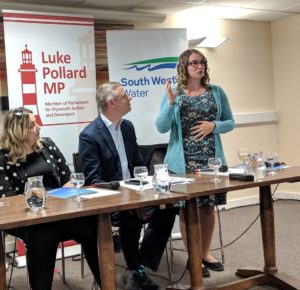Pamela Buchan is a final year ESRC funded PhD student investigating marine citizenship at Exeter University, via the SW Doctoral Training Partnership. She was elected a Plymouth City Councillor in 2018
As PhD researchers, whatever the topic that most floats our boat, most of us want to create impact and make change. There are lots of different ways to do that in life and research can be a very effective one, feeding into policy and education, and creating direct impact through participatory research.
It was not exactly by design that I became a city councillor, though my career and moral trajectory clearly led me that way, but it nonetheless happened in 2018, slap bang in the middle of my second PhD year. This blog could be a look at how that happened, or it could be about how I manage my time (hint: I went part time for my final year). Instead it will be about why PhD researchers should get engaged in politics.
- It will satisfy your cravings for novelty and challenge
Maybe this is only interdisciplinary researchers, but I love a good complex issue that needs lots of thought and contains lots of ideas to chew on. Being a councillor is a bit like being an interdisciplinary researcher – both look to tackle complex issues; both draw on a range of skills; both are more impact oriented. As a councillor I work on loads of different issues and it’s very satisfying to put my analytical and critical skills to the test in creating tangible change for people.
- It won’t satisfy your craving for impact, but it will help
Being a councillor is like being a PhD researcher in that they can both be incredibly frustrating. Things don’t always work. Results aren’t always what you wanted or expected. Hurdles must be surmounted and compromises have to be made to reach the end goal. But that goal will be reached and something real will come out of your labours.
- It will give meaning to your research
It’s easy to get wrapped up in academia and theoretical thinking. Being in politics keeps you grounded and provides insight into how your research, whatever the field, fits into the grander scheme of things. It will remind you why you are doing it and what you want to achieve.
- It will open doors
This has been the most surprising for me. My tiny bit of specialism has aligned remarkably with things happening where I live and being a councillor means invitations to meetings, opportunities to network, access to other politicians, and insight into policy that a PhD student wouldn’t typically have. I’ve twice mentioned my PhD research in full council meetings, and I get to apply my skills and knowledge to the climate emergency response.
- It’s your responsibility
We are often funded by the public. Our goal is to improve society or the environment, or to make things easier or fairer. It’s a privilege to be a researcher and we owe it to others to make the most of the skills and knowledge we have developed, through impact. Getting involved in politics, be it as a campaigner, elected member, or through policy making, should be at the heart of what we do.
Facebook https://www.facebook.com/Pam4Plymouth
Twitter www.twitter.com/Asterinidae

